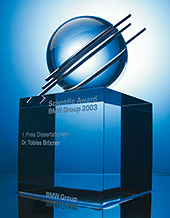BMW Scientific Global Award for Gerald Stieglbauer
BMW Scientific Global Award, 1st Prize, Graduate and Master Theses: Dipl.-Ing. Gerald Stieglbauer
The thesis
The graduating thesis of Gerald Stieglbauer makes a decisive contribution to solving certain problems in the field of programming of embedded systems. Embedded systems are computer systems embedded in another technical system that is not characterized as a computer, for example a CD player or automotive navigation system. "To master the increasing complexity of embedded software, abstractions must be introduced," explains Gerald Stieglbauer. "Suitable abstractions make it possible to compose partial systems while complying with the requirements of real time. This means, for example, that several functions can either be executed on an Electronic Control Unit (ECU) or moved between different ECUs." The thesis is based on the abstraction that goes by the name of Giotto, which was invented at the University of California at Berkeley that has already proved its value for embedded software and is available as an open standard. In his paper, this junior scientist has succeeded in integrating Giotto in the worldwide modeling tool Matlab/Simulink, thus making it accessible for industrial applications.
The researcher
Gerald Stieglbauer is a "full-blooded" computer scientist who lives which other computer scientists in a completely networked commune in Salzburg. Besides hardware and software, Gerald Stieglbauer is also interested in Asian and European cinematic art. He is disappointed that the film has not yet been fully recognized as an art form. The "Mother of All Sciences," i.e. philosophy, is another field of interest of this junior research scientist. As a computer scientist, this discipline fascinates him mainly because of the plethora or information and communication that characterizes our age and the problems, and challenges, they imply.



